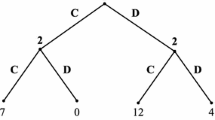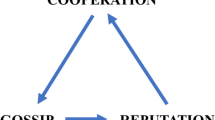Abstract
This paper conductsan experiment to investigate the economic effect of public disclosureswithin a multi-move adaptation of the Prisoner's Dilemma game.The game, which has multiple equilibria, is characterized by:(1) a stochastic endpoint, (2) random, repeated pairings withanonymous partners, and (3) public disclosures concerning thecurrent partner's previous strategies. In the experiment, cooperationis improved by the disclosures. In addition, subjects cooperatemore frequently when encountering a player who has tended tocooperate in the past, and less frequently when encounteringa player who has tended to defect in the past. Delayed disclosureleads to levels of cooperation only slightly less than thoseobtained with timely disclosure.
Similar content being viewed by others
References
Andreoni, J., and J. Miller. (1993). “Rational Cooperation in the Finitely Repeated Prisoner's Dilemma: Experiment Evidence.” The Economic Journal May, 570–585.
Antle, R. (1982). “The Auditor as an Economic Agent.” Journal of Accounting Research 20, 503–527.
Arya, A., J. Glover, and R. Young. (1996). “Capital Budgeting in a Multidivisional Firm.” Journal of Accounting, Auditing and Finance Fall, 519–533.
Axelrod, R. (1984). The Evolution of Cooperation. New York: Basic Books.
Berg, J., J. Dickhaut, and K. McCabe. (1995). “Trust, Reciprocity, and Social History.” Games and Economic Behavior 10, 122–142.
Butler, D. (1992). “An Experimental Investigation into the Effects of Uncertainty on Rational Behaviour in Two-person Symmetric Games.” Journal of Behavioral Decision Making 5(4), 283–301.
Cooper, R., D. DeJong, R. Forsythe, and T. Ross. (1996). “Cooperation without Reputation: Experimental Evidence from Prisoner's Dilemma Games.” Games and Economic Behavior 12, 187–218.
Dawes, R.M. (1990). “Social Dilemmas.” Annual Review of Psychology, 169–193.
Dawes, R.M., and R. Thaler. (1988). “Anomalies: Cooperation.” Journal of Economic Perspectives 2(3), 187–197.
Demski, J., and D. Sappington. (1983). “Multi-Agent Control in Perfectly Correlated Environments.” Economic Letters 13, 325–330.
Demski, J., and D. Sappington. (1984). “Optimal Incentive Contracts with Multiple Agents.” Journal of Economic Theory 33, 152–171.
Dickhaut, J., and K. McCabe. (1997). “The Behavioral Foundations of Stewardship Accounting and a Proposed Program of Research: What is Accountability?” Behavioral Research in Accounting 9.
Frank, R. (1987). “If Homo Economicus Could Choose His Own Utility Function, Would He Want One with a Conscience?” American Economic Review 77, 593–604.
Kahneman, D., J. Knetsch, and R. Thaler. (1986). “Fairness and the Assumptions of Economics.” Journal of Business 59, S285–S300.
Kreps, D. (1990a). A Course in Microeconomic Theory. Princeton University Press.
Kreps, D. (1990b). “Corporate Culture and Economic Theory.” In J. Alt and K. Shepsle (eds.), Perspectives on Positive Political Economy. New York: Cambridge University Press.
Kreps, D., P. Milgrom, J. Roberts, and R. Wilson. (1982). “Rational Cooperation in the Finitely Repeated Prisoners' Dilemma.” Journal of Economic Theory 27, 245–252.
Mookherjee, D., and S. Reichelstein. (1992). “Dominant Strategy Implementation of Bayesian Incentive Compatible Allocation Rules.” Journal of Economic Theory 60, 161–192.
Rapaport, A., and A. Chammah. (1965). Prisoner's Dilemma. Ann Arbor: University of Michigan Press.
Roth, A. (1988). “Laboratory Experimentation in Economics: A Methodological Overview.” Economic Journal 98, 974–1031.
Roth, A., and J. Murnighan. (1978). “Equilibrium Behavior and Repeated Play of the Prisoner's Dilemma.” Journal of Mathematical Psychology 17, 189–198.
Van Huyck, J., R. Battalio, and M. Walters. (1997). “Is Reputation a Substitute for Commitment in the Peasant-Dictator Game ?” Working paper. Texas A & M University, October.
Author information
Authors and Affiliations
Rights and permissions
About this article
Cite this article
Schwartz, S.T., Young, R.A. & Zvinakis, K. Reputation Without Repeated Interaction: A Role for Public Disclosures. Review of Accounting Studies 5, 351–375 (2000). https://doi.org/10.1023/A:1026501807727
Issue Date:
DOI: https://doi.org/10.1023/A:1026501807727




